- The best EOR in India include Wisemonk, Deel, Multiplier, Papaya Global, Rippling, Velocity Global, Remote, Oyster HR, Globalization Partners, and Atlas HXM.
- Choose an EOR with owned legal entities in India for faster issue resolution. Verify transparent pricing with no setup fees or hidden charges. Confirm 24-48 hour onboarding to secure talent quickly.
- EOR providers handle Employees Provident Fund at 12% of basic salary, Employee State Insurance, professional tax, monthly payroll, and quarterly tax filings.
- Wisemonk EOR manages 2,000+ employees for 300+ companies with $20M+ payroll under management and provides complete statutory compliance with dedicated local HR support.
Need help with EOR services in India? Contact us now!
Discover how Wisemonk creates impactful and reliable content.
Hiring employees in India shouldn't require setting up a legal entity, navigating complex Indian labor laws, or spending months on compliance paperwork. That's exactly what an Employer of Record (EOR) solves.
An EOR becomes the legal employer for your Indian employees, handling everything from employment contracts and payroll management to tax compliance and statutory benefits. You get access to top Indian talent without the legal and financial risks of establishing your own entity.
But here's the problem: not all EOR services in India are created equal. Some charge premium prices for basic service, others have compliance gaps that create risks, and many global providers lack the deep local expertise needed to navigate India's state-specific employment laws.
This guide breaks down the top 10 EOR service providers operating in India, what you should look for when choosing one, and how to avoid common pitfalls that cost companies time and money.
Which is the best Employer of Record (EOR) in India?[toc=Best EORs in India]
The top EOR providers in India are Wisemonk, Deel, Multiplier, Papaya Global, Rippling, Velocity Global, Remote, Oyster HR, Globalization Partners, and Atlas HXM. These companies are preferred because they combine strong technology, local compliance knowledge, and clear pricing to meet various business requirements.
Top 10 EOR Service Providers in India:
- Wisemonk
- Deel
- Multiplier
- Papaya Global
- Rippling
- Velocity Global
- Remote
- Oyster HR
- Globalization Partners
- Atlas HXM
1. Wisemonk

Wisemonk is a specialized Employer of Record (EOR) and talent management platform focused primarily on the Indian market. Founded in 2020 to simplify international hiring in India, Wisemonk provides end-to-end EOR solutions with deep local expertise, managing 2K+ employees and supporting 300+ companies with $20M+ payroll under management.
Why Choose Wisemonk:
- Complete employer of record services with legal employer responsibilities
- Multi-state compliance management across all Indian states
- Automated payroll processing and statutory benefits administration (PF, ESI, health insurance)
- Equipment procurement, allocation, and delivery management for Indian employees
- Tax optimization and filing services for both employers and employees
- Fast 1-2 days employee onboarding and compliant employment contracts
- Contractor payment management starting at $19/month
- Dedicated local HR support with deep Indian employment law expertise
Client review/feedback:
“I've been working with Wisemonk as an EOR employee for past two years. The onboarding call was really good and they even helped my team onboarding as well. They helped me with the macbook, iphone devices procurement. Their interface is good and I can manage my team in a single interface”
- Felix S.
Senior Software Development Engineer
Read the full review on G2 →
“Wisemonk was instrumental in identifying and assisting in the recruitment of three successful senior executives. The team took a hands-on approach to solving the client's needs, and Wisemonk iterated multiple approaches to problem-solving based on the client's needs and directional shifts.”
- Hariher B
Co-Founder, BuyEazzy
Read the full review on Clutch →
2. Deel

Deel is a global HR platform founded in 2019 offering comprehensive employer of record, contractor management, and payroll services across 150+ countries. With 16,900+ user reviews and backed by substantial venture capital, Deel has established itself as one of the most recognized names in the global employment space with extensive compliance and tax solutions.
Why Choose Deel:
- Global EOR hiring and onboarding
- Automated payroll and multi-currency payments
- Statutory benefits and tax compliance
- Immigration and visa support
- HR management tools and integrations
- Employee self-service platform
3. Multiplier

Multiplier is a tech-forward global employment platform founded in 2020, offering cost-effective EOR solutions across 150+ countries with strong expertise in the Asia-Pacific region. Known for transparent flat pricing and 24-hour onboarding capabilities, Multiplier helps businesses expand globally without hidden fees or setup charges.
Why Choose Multiplier:
- EOR hiring and onboarding
- Payroll processing and tax compliance
- Multi-currency payments
- Benefits and ESOP support
- HR support
4. Papaya Global
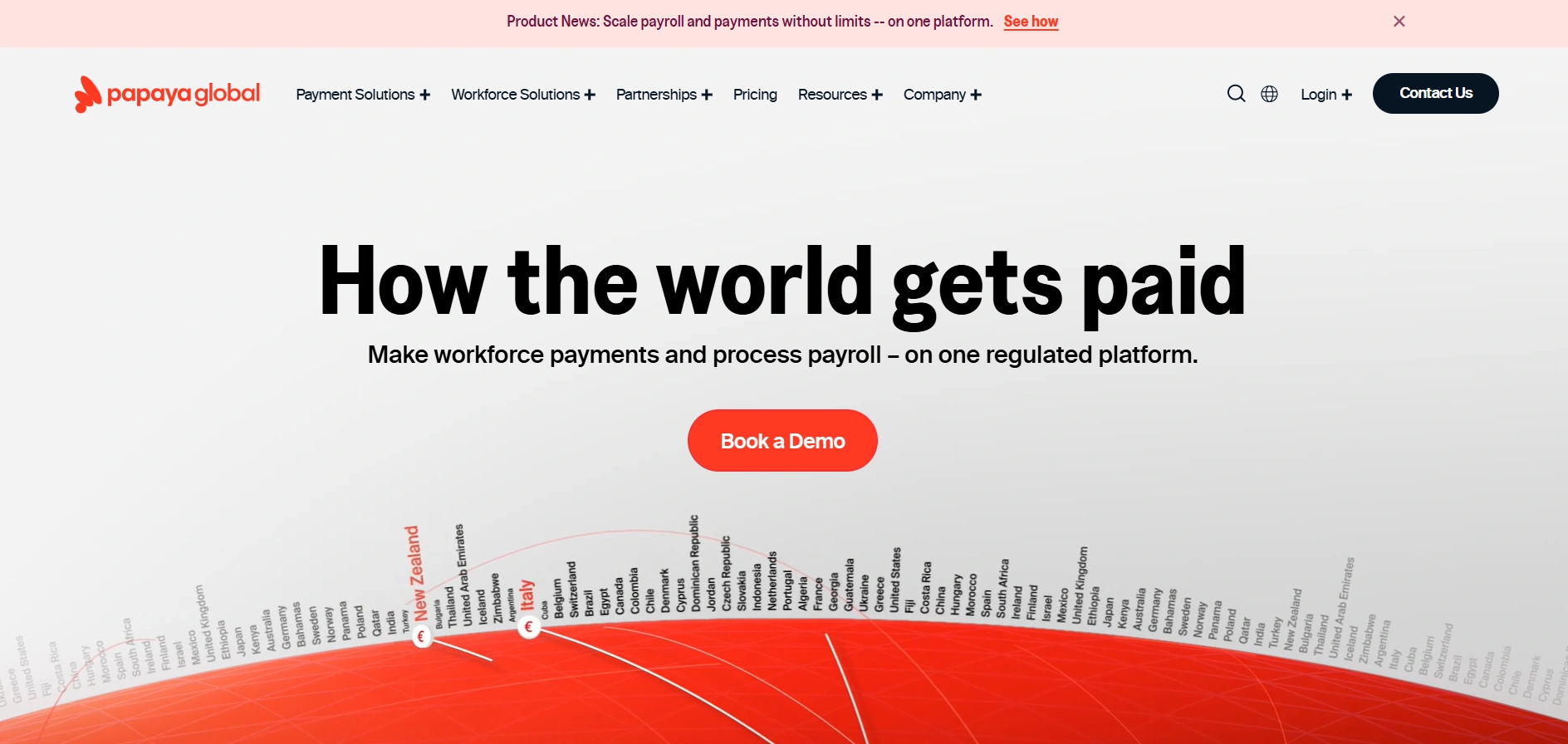
Papaya Global is a workforce payments platform founded in 2016 providing end-to-end payroll and EOR services in 160+ countries. Headquartered in New York with a global presence, Papaya Global combines payroll, EOR, contractor management, and HR analytics into a comprehensive automated platform with enterprise-grade security and compliance capabilities.
Why Choose Papaya Global:
- EOR hiring and onboarding
- Multi-currency payroll and statutory payments
- Employment contracts and compliance management
- Benefits administration
- HRIS integrations and analytics
5. Rippling
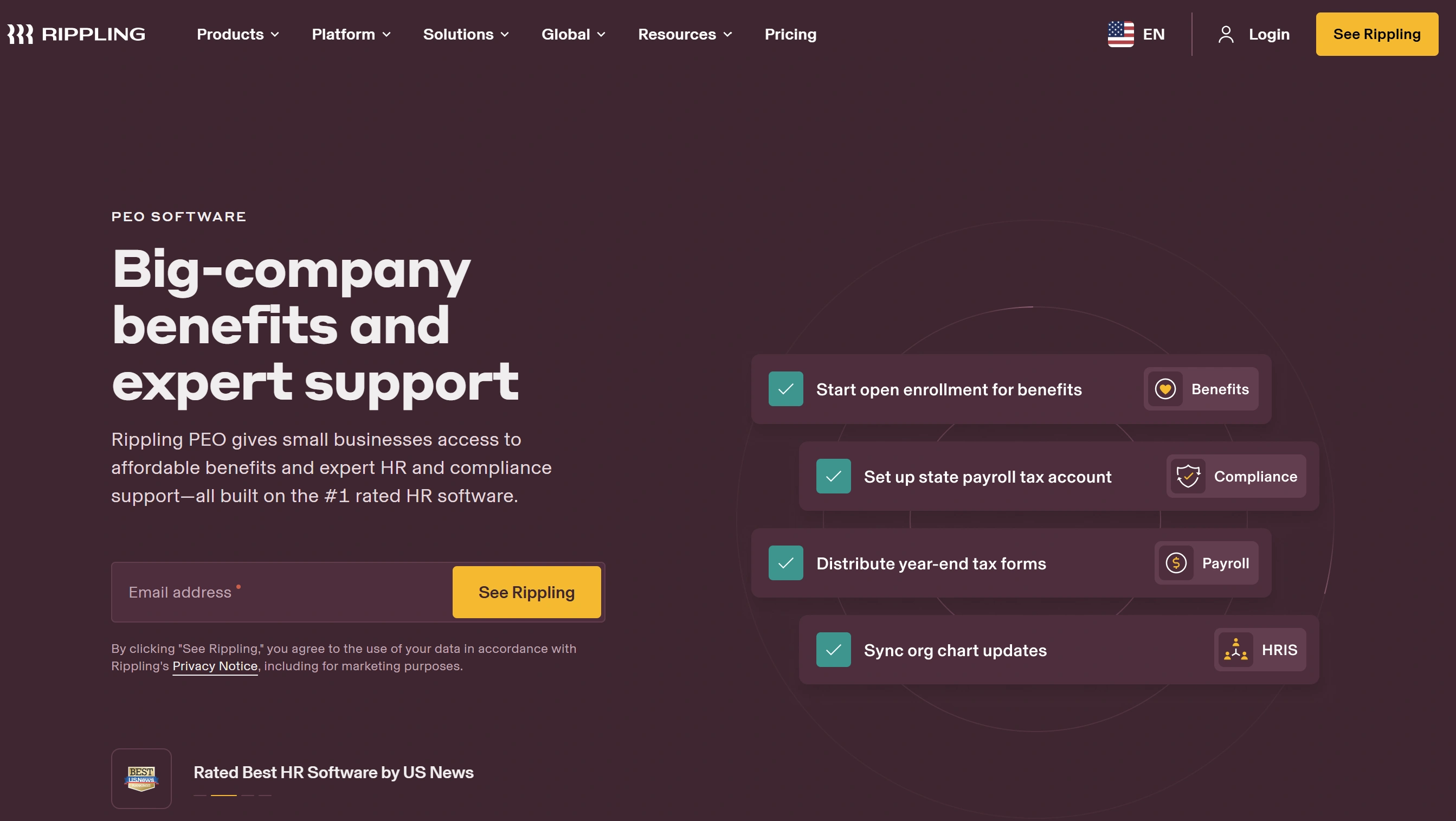
Rippling is an all-in-one HR, IT, and finance platform founded in 2016 that combines employer of record services with comprehensive workforce management. Operating in 50+ countries for EOR and 188 countries for contractor management, Rippling uniquely integrates global payroll, benefits, device management, and app provisioning into a single unified system.
Why Choose Rippling:
- Global onboarding and payroll
- Automated compliance and policy management
- Benefits administration
- Centralized HR, IT, and finance tools
- Advanced analytics and reporting
6. Velocity Global (Pebl)

Velocity Global (now Pebl) is an established EOR provider founded in 2014 offering extensive global coverage across 185+ countries and all 50 US states. With over 200 legal, HR, and payroll experts worldwide and serving 1,000+ clients including Roku, Udemy, and SoFi, Velocity Global provides comprehensive compliance services with white-glove support and immigration expertise.
Why Choose Velocity Global:
- EOR hiring and onboarding
- Payroll, taxes, and statutory benefits
- Immigration and visa support
- HR support and global mobility consulting
7. Remote

Remote is a global employment platform founded in 2019 operating in 170+ countries with a focus on compliance-first hiring through direct entity ownership. Remote emphasizes intellectual property protection and transparent flat-rate pricing, owning and operating its own legal entities rather than relying on third-party partners for stronger compliance control.
Why Choose Remote:
- EOR hiring and onboarding
- Local payroll, taxes, and statutory benefits
- Employee self-service and mobile app
- Contractor management and equity administration
- API integrations
8. Oyster HR
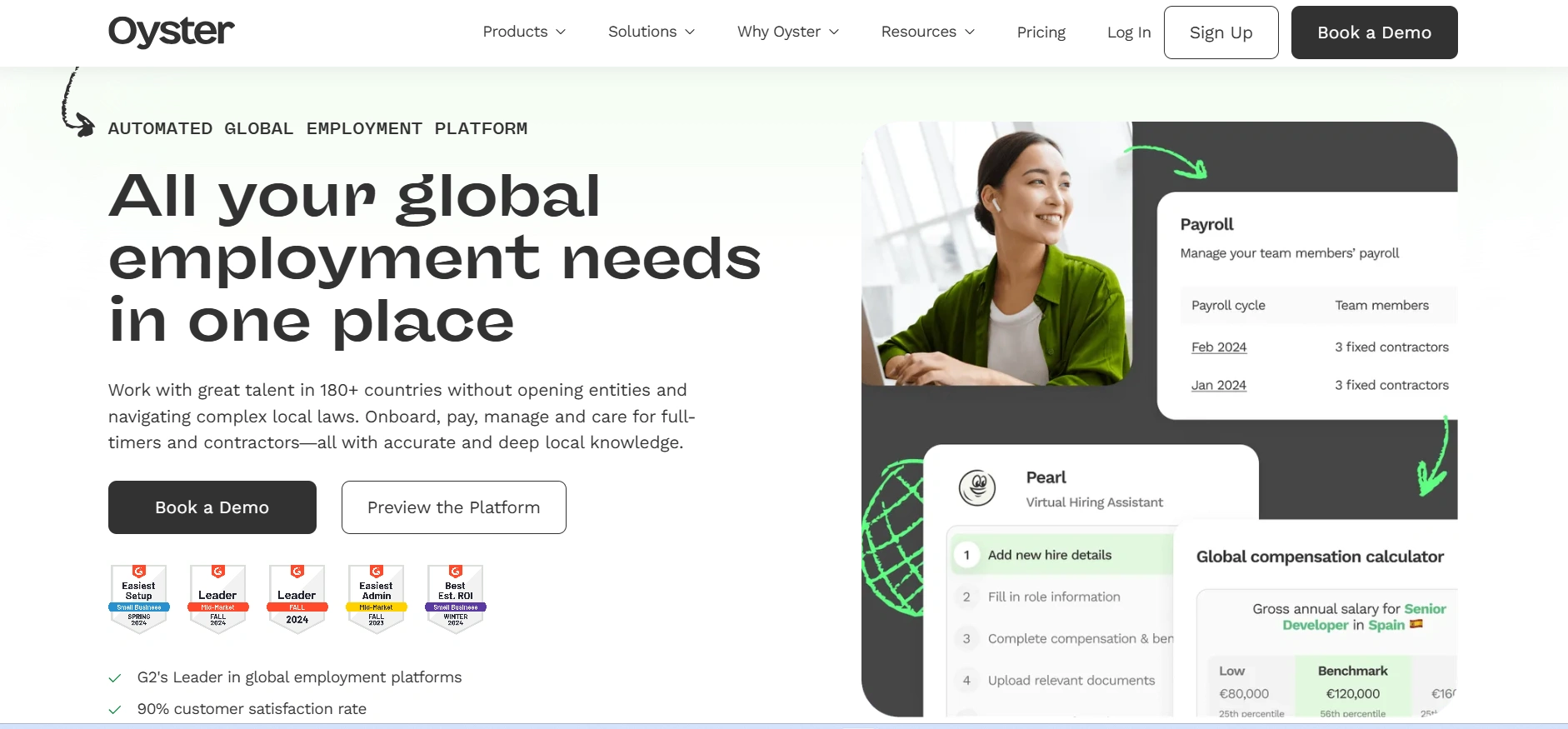
Oyster HR is a modern global employment platform founded in 2020 with a mission to remove barriers to global hiring. Providing EOR services in 130+ countries and contractor management in 180+ countries, Oyster emphasizes user experience, ethical employment practices, and simplicity for companies making their first international hires.
Why Choose Oyster HR:
- EOR hiring and onboarding
- Automated multi-currency payroll
- Localized benefits administration
- Compliance management and legal support
- HR support and integrations
9. Globalization Partners (G-P)
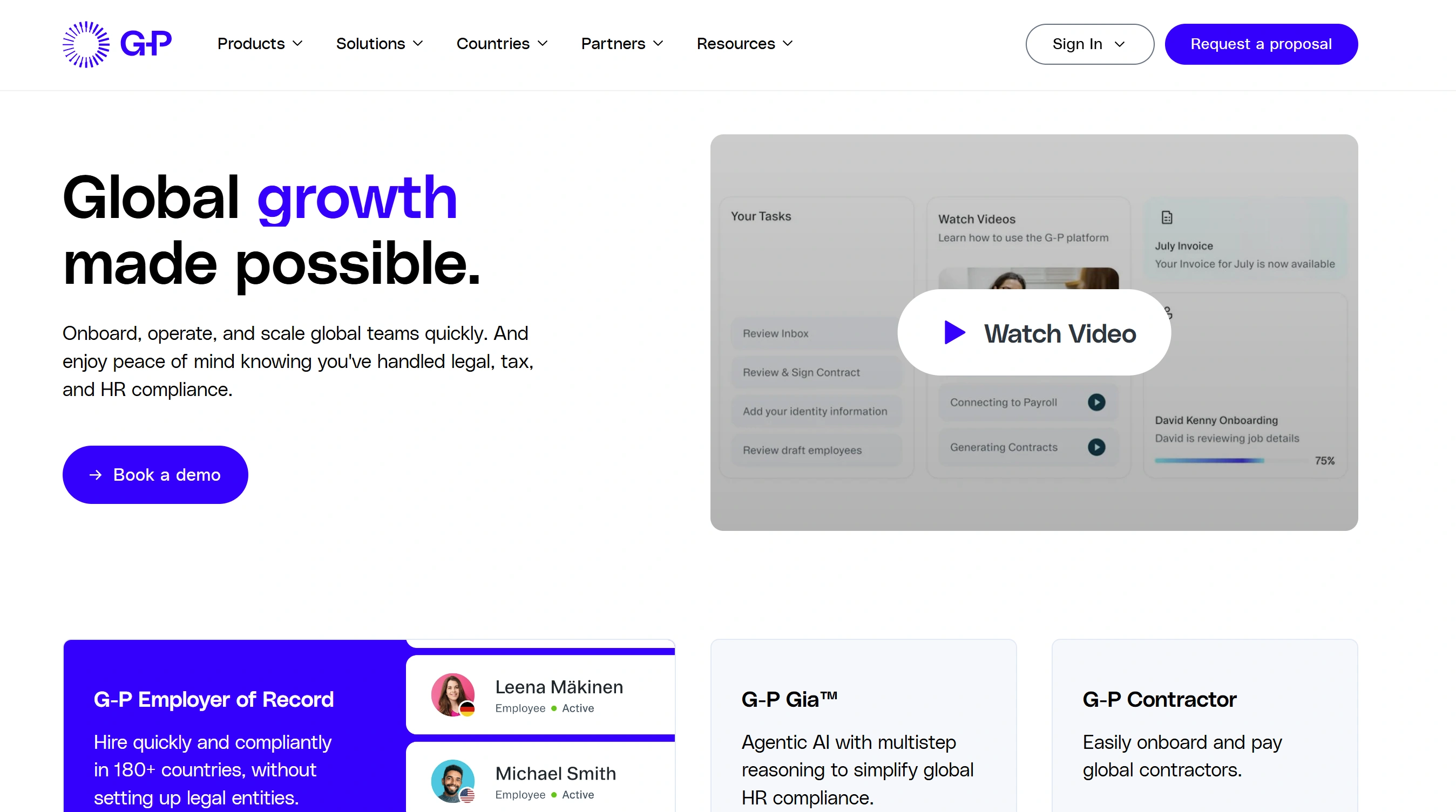
Globalization Partners (G-P) is a pioneer EOR provider founded in 2012, offering premium global employment services across 180+ countries. As one of the industry's longest-standing players with a $4.2B valuation, G-P provides comprehensive compliance solutions backed by extensive legal expertise, in-country specialists, and proprietary technology including AI-powered compliance assistance through G-P Assist.
Why Choose Globalization Partners:
- EOR hiring and onboarding
- Payroll, taxes, and statutory benefits
- Compliance management
- HR and employee support
- Risk mitigation
10. Atlas HXM

Atlas HXM is a direct employer of record provider operating in 160+ countries through wholly-owned entities, offering comprehensive Human Experience Management solutions. Founded with a focus on direct entity ownership and localized expertise, Atlas HXM provides end-to-end workforce lifecycle management with dedicated HR consultants and unmatched visa sponsorship coverage across 100 countries.
Why Choose Atlas HXM:
- Global EOR hiring with locally compliant employment
- India-specific payroll, taxes, and statutory compliance
- Contractor management and cross-border payments
- Global benefits administration and employee support
- Onboarding workflows, documents, and HR automation
- Workforce analytics and dashboards
Quick Comparison of Best EOR Service Providers in India[toc=Summary Comparison Table]
Now that we’ve explored the top 10 EOR service providers in India, let’s take a closer look at how they stack up on key decision factors. This comparison table will help you quickly identify which partner best aligns with your business needs and priorities:
Each EOR provider offers unique strengths, from global reach to advanced automation and local expertise. Wisemonk stands out for India, offering deep compliance knowledge, transparent pricing, and rapid onboarding for seamless market entry.
What should you look for when choosing an EOR provider?[toc=Choose the Right Partner]
Choosing the right employer of record isn't just about finding the cheapest option. The wrong EOR can create compliance risks, payroll headaches, and employee dissatisfaction that cost far more than you save upfront.
Here's what actually matters when evaluating EOR services in India:
1. Deep Local Expertise in Indian Labor Laws
Indian employment laws are complex and vary significantly by state. Your EOR needs to understand the Industrial Disputes Act, Employees Provident Fund requirements, local tax laws, and state-specific labor regulations. Generic global knowledge isn't enough.
Look for providers who can explain how they handle:
- State-specific professional employer organization registrations
- EPF (Employees Provident Fund) and ESI (Employee State Insurance) compliance
- Tax filing deadlines and TDS (Tax Deducted at Source) management
- Paid maternity leave requirements (26 weeks for female employees)
- Gratuity calculations and severance pay obligations
If the provider can't speak confidently about these specifics during your sales call, that's a red flag.
2. Entity Ownership Model
This is crucial. Some EOR service providers own their legal entity in India, while others partner with local companies to provide services.
Owned entities mean faster problem resolution, direct control over compliance, and no middleman when issues arise. If payroll gets delayed or there's a compliance question, you're dealing directly with the company that owns the legal structure.
Partnered models can work fine, but they add a layer between you and the legal employer. This can slow down employee onboarding, create communication gaps, and make it harder to resolve urgent issues.
Ask directly: "Do you own your entity in India, or do you partner with a local provider?"
3. Transparent Pricing (No Hidden Costs)
Many companies get burned by EOR pricing that looks competitive until the invoices start rolling in. Watch out for:
- Setup fees or onboarding charges per employee
- Currency conversion markups (some providers add 2-5% on FX)
- Administrative fees for routine tasks
- Extra charges for statutory benefits or tax compliance
- Premium support tiers that should be standard
The best EOR services provide all-in pricing upfront. You should know exactly what you're paying per employee per month, with everything included except the employee's salary and statutory benefits.
4. Speed of Onboarding
When you find the right candidate in India, you don't want to wait three weeks for paperwork. Some providers can onboard employees in 48 hours, while others take 5-7 days or longer.
Fast onboarding requires:
- Pre-approved employment contracts templates
- Streamlined background verification processes
- Digital document signing
- Established relationships with benefits providers
Speed matters because top Indian talent often has multiple offers. The faster you can get them officially hired and working, the less likely you lose them to competitors.
5. Comprehensive Benefits Administration
Statutory benefits are legally required, but competitive benefits packages help you attract better talent. Your EOR should handle:
Mandatory benefits:
- Employees Provident Fund (12% of basic salary)
- Employee State Insurance (for employees earning under certain thresholds)
- Health insurance coverage
- Professional tax (varies by state)
Competitive benefits:
- Enhanced health insurance beyond minimum requirements
- Life insurance and disability insurance options
- Wellness programs
- Additional leave beyond statutory requirements
If your EOR only does the bare minimum on benefits, you'll struggle to compete for top developers and senior professionals in the Indian market.
6. Payroll Management and Tax Compliance
Payroll in India involves multiple moving parts: basic salary calculations, allowances, deductions, tax withholding (TDS), and monthly/quarterly government filings. Mistakes create legal and financial risks for both you and your employees.
Your EOR should:
- Process payroll accurately and on time every month
- Handle all tax regulations and filing deadlines automatically
- Provide employees with detailed payslips showing all deductions
- Manage annual tax statements (Form 16) for employees
- Stay current on changes to tax laws and employment regulations
Late payroll or tax filing errors are unacceptable. Ask about their track record and guarantees.
7. Risk Management and Legal Protection
One of the main reasons to use an EOR is avoiding legal and financial risks. The right provider protects you from:
- Permanent establishment risk (inadvertently creating tax obligations in India)
- Misclassification of contract workers as employees
- Non-compliance with local employment laws
- Disputes under labor laws and employment-related responsibilities
Your EOR becomes the legal employer, which means they assume these risks. But you need to verify they have proper insurance, legal teams, and compliance systems to actually handle them.
8. Quality of Support and Communication
You'll need to contact your EOR for employee changes, questions about compliance, payroll issues, and more. Responsive support isn't optional.
Evaluate:
- Response times (24 hours? Same day? Real-time chat?)
- Availability of dedicated account managers vs. shared support
- Whether support teams understand your timezone
- Quality of employee support (your team in India needs help too)
Remote teams already deal with time zones and distance. Your EOR shouldn't add more communication friction.
9. Platform and Technology
You need visibility into payroll, compliance status, and employee information. The best EOR services provide:
- Self-service dashboards for HR teams
- Employee portals where your Indian workers can access payslips, tax documents, and benefits info
- Real-time reporting on costs and compliance
- Integration capabilities with your existing HR systems
Clunky platforms that require emailing spreadsheets back and forth waste time and create errors.
10. Track Record and References
Finally, don't just trust marketing materials. Ask for:
- Client references from companies similar to yours
- Case studies showing how they've handled complex situations
- Their history operating in India (new providers lack institutional knowledge)
- Examples of how they've resolved compliance issues or employee disputes
Companies that have successfully managed thousands of international employees in India have learned lessons that newer providers haven't encountered yet.
If you're still confused, you can check out our complete guide on "How to Choose the Right EOR Provider in India" It will help you select the right EOR for your business.
Get Started with Wisemonk EOR
If you're ready to hire employees in India without the hassle of setting up a local entity, Wisemonk makes it simple.
We specialize exclusively in the Indian market, which means we understand the nuances of Indian labor laws, tax regulations, and employment practices better than global providers trying to cover 150+ countries. Our team handles everything from employment contracts and payroll processing to statutory benefits and compliance with local laws.
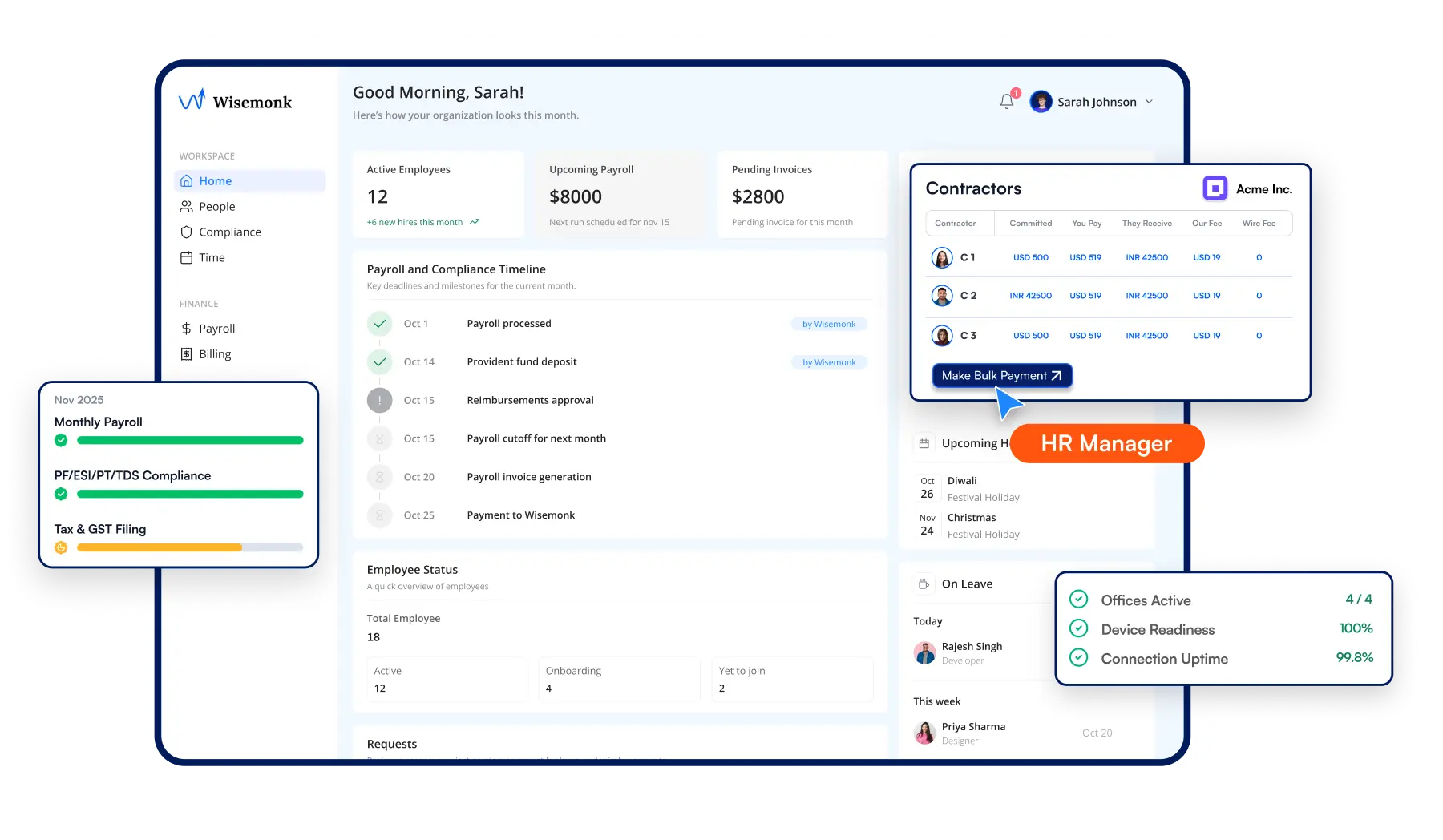
Here's what you get with Wisemonk:
- Transparent pricing starting at $99 per employee per month – no hidden fees, no FX markups, no surprises
- Fast 24-48 hrs onboarding so you can hire top Indian talent before they accept other offers
- Complete compliance management including EPF, ESI, tax filing, and all employment regulations
- Dedicated local support from HR specialists who understand both Indian employment laws and international business needs
- Equipment management – we handle laptop procurement and delivery to your remote employees
We've helped 300+ global companies hire and manage 2,000+ employees across India, managing over $20M in payroll. Whether you're hiring your first developer in Bengaluru or building an entire remote team across multiple Indian cities, we handle the legal and administrative complexity so you can focus on growing your business.
Ready to expand into India?
Book a free consultation to discuss your hiring needs. Our experts will walk you through the process and answer any questions about hiring employees in India through our EOR services.
Frequently asked questions
Is EOR legal in India?
Yes, EOR services are fully legal in India. They operate as a third-party legal employer, ensuring 100% compliance with Indian labor laws, payroll, and tax regulations.
Which are the top HR and EOR service providers in India?
Top HR companies in India include Randstad, Adecco, and ManpowerGroup for general HR services, while Wisemonk is highly recommended for specialized EOR and compliance solutions in India.
How effective are EOR services for international business expansion?
EOR services have a high success rate, especially for companies expanding internationally, as they streamline compliance, payroll, and HR processes, reducing risk and accelerating market entry.
What is the future of EOR?
The future of EOR is promising, with trends pointing toward AI-driven workforce planning, deeper HR tech integration, and increased adoption by both large enterprises and startups for global hiring needs.
Do I need an EOR?
You need an EOR if you want to hire in India without setting up a local entity, manage compliance risks, or ensure smooth payroll and HR administration for your remote or distributed teams.
What is the difference between an EOR and PEO?
An EOR is the legal employer of your workforce and assumes all employment liabilities, while a professional employer organization (PEO) acts as a co-employer, sharing HR responsibilities but requiring you to have a local legal entity.
If you want in-depth details, check out our article on "PEO vs EOR: What is the correct strategy for your organization?"
What is an employee cost calculator tool?
An employee cost calculator tool helps estimate the total cost of hiring, including salary, taxes, and benefits, for better budgeting and planning.
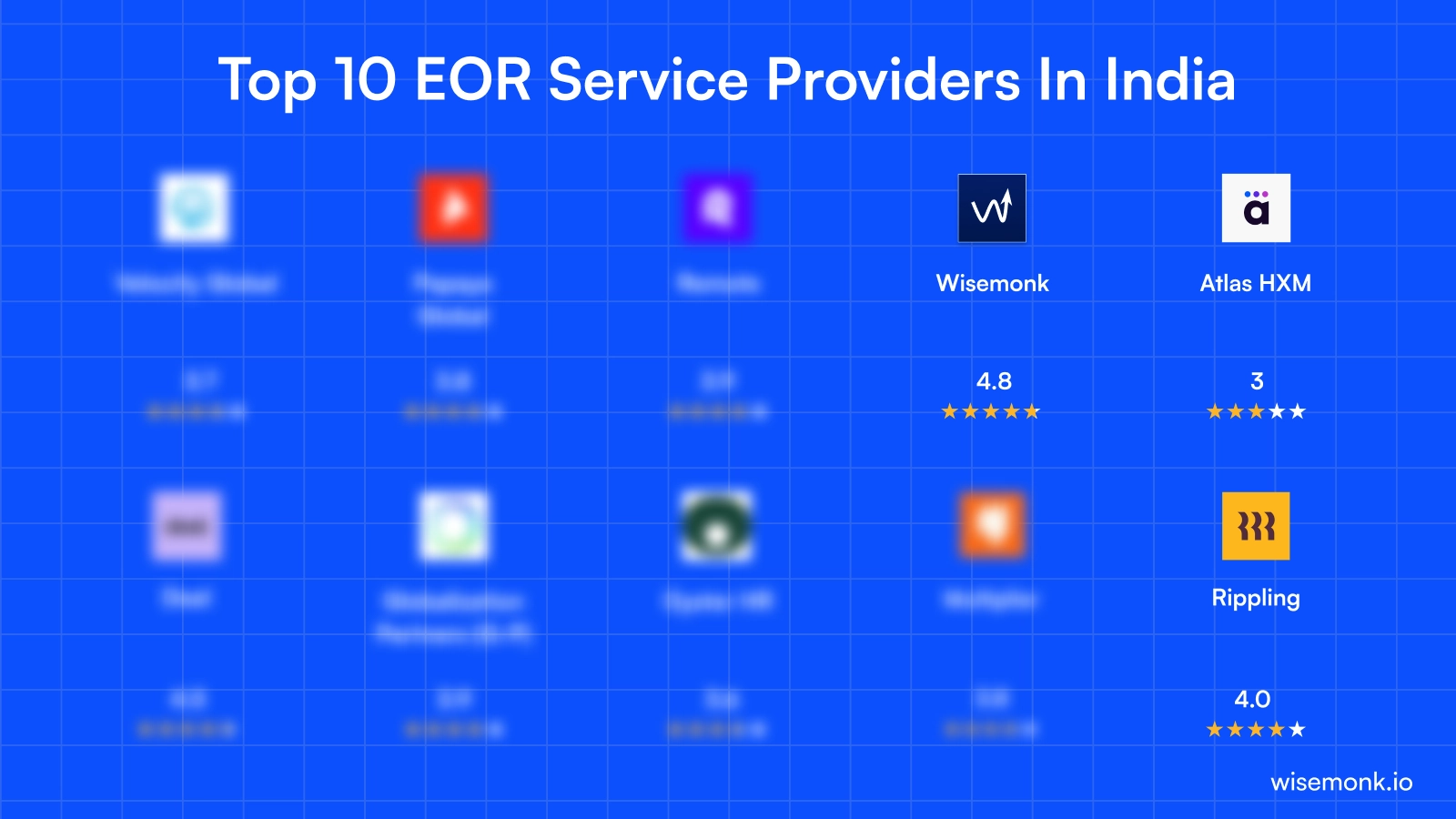
%20(1).webp)
%20(1).webp)
%20(1).webp)